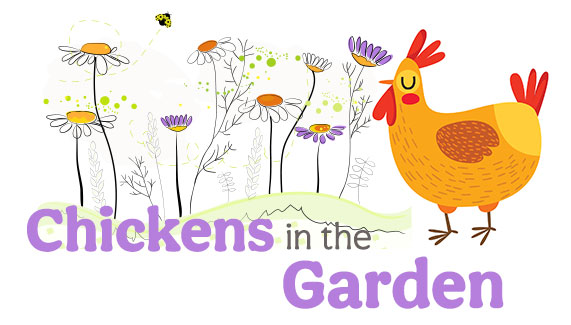As the growing season has come to a close here in the Midwest, garden cleanup has commenced. In the vegetable garden, it’s important to remove any diseased plants and diseased leaves and destroy. Avoid putting anything diseased in your compost pile. I live outside the city limits, so can burn diseased garden debris. If you can’t burn and your compost doesn’t heat up to over 140 degree Fahrenheit, it’s best to put diseased debris in the trash or lawn refuse for removal. Disease can live in a compost pile, so it’s possible to re-introduce disease if you plan to use the compost in the spring.
Let Chickens Help
After removing diseased plants from my garden, I opened the gate and let the chickens in to forage. They went straight for the raised beds, their favorite place to dust bathe. I also left some cool season kale, a chicken favorite.
Chickens do a great job of breaking up the dirt and spreading out organic mulch. I usually add seedless straw for an overwintering mulch, which helps to prevent erosion over the winter. If I raked my yard, I would add decaying leaves, which would also break down over the winter, adding nutrients and good microorganisms to the soil.
Chicken Manure in Compost
A few chicken droppings are a good addition to the compost pile as well. Chicken manure is extremely rich and should never be added directly to a vegetable garden, as it could burn plantings. However, composted manure makes a great, nutrient-rich compost. An average hen can produce over 1 cubic foot of manure over the winter, so adding about 1 part poultry manure with 3 parts organic bedding materials, such as straw or leaves, will keep the carbon-nitrogen ratio optimal. In a well-managed compost pile, any bacteria from poultry feces should die off before it’s time for spring planting in May. Because poultry manure carries high amounts of bacteria, a 120-day waiting period between adding compost to a vegetable garden and harvest is recommended.
Raw poultry manure can be added directly to the garden using a sheet composting method, with layers of organic matter such as straw or leaves. You should smell no offensive ammonia odors when the compost is ready, and organic materials of straw or leaves, should be broken down. Adding raw chicken manure works best in the fall, as the high salt content of the manure will have time to leach out before spring planting time. If high contents of salt remain, new seedlings could be damaged. The higher the ratio of manure to straw or leaves, the more risk of salt damage.
Don’t Forget Pollinators
Leave your dead annuals and perennials standing over the winter, as important pollinators use the stems and stalks to overwinter. If you must cut them down, consider leaving plant debris on the ground for insect cover and winter housing. Keep your chickens out of the fall flower beds, as their destructive scratching can damage tender roots.
For more information on composting with poultry manure, read this great extension publication from the University of Idaho Extension: https://www.extension.uidaho.edu/publishing/pdf/CIS/CIS1194.pdf



